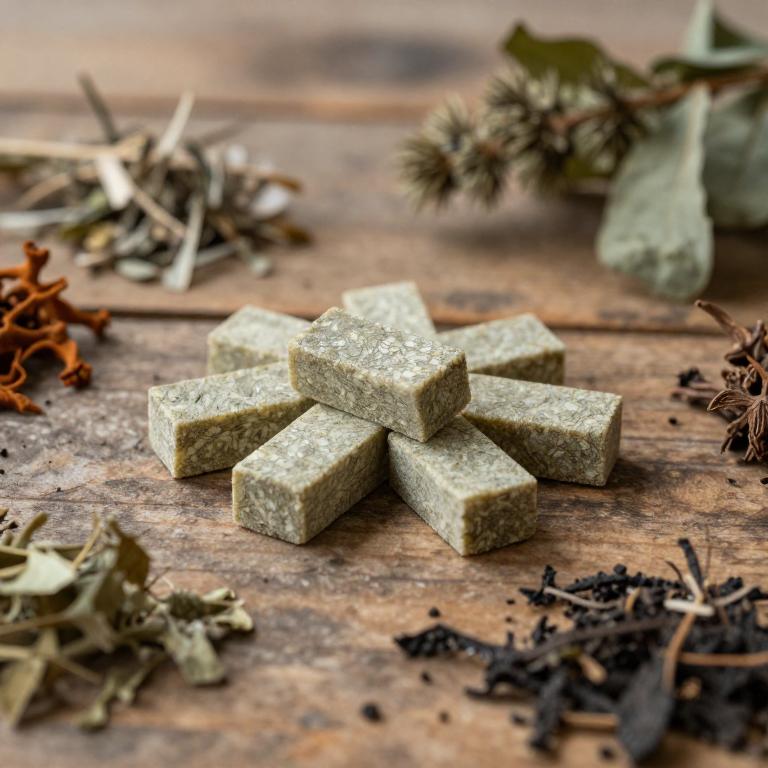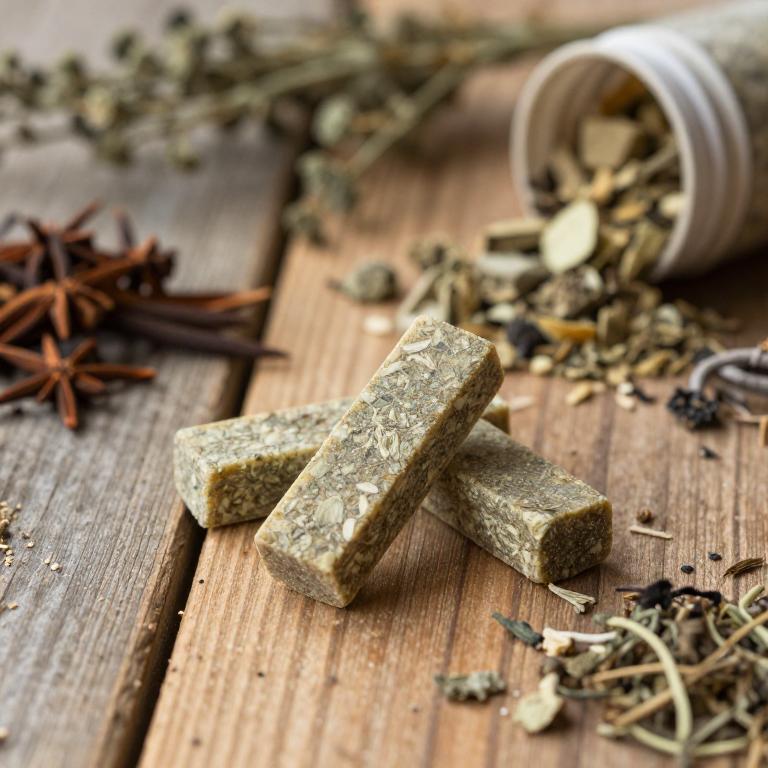10 Best Herbal Lozenges For Bronchitis

Herbal lozenges are commonly used to alleviate symptoms of bronchitis by soothing irritated throat tissues and reducing inflammation.
These lozenges often contain natural ingredients such as echinacea, ginger, licorice root, and eucalyptus, which are believed to have antimicrobial and anti-inflammatory properties. They can help ease coughing and mucus production, making them a popular alternative or complementary therapy for mild to moderate bronchitis. While they are generally safe for most adults, it is advisable to consult a healthcare provider before use, especially for those with allergies or chronic respiratory conditions.
Overall, herbal lozenges offer a gentle, natural approach to managing bronchitis symptoms when used as part of a broader treatment plan.
Table of Contents
- 1. Eucalyptus (Eucalyptus globulus)
- 2. Thyme (Thymus vulgaris)
- 3. Peppermint (Mentha piperita)
- 4. Ginger (Zingiber officinale)
- 5. Licorice (Glycyrrhiza glabra)
- 6. Fennel (Foeniculum vulgare)
- 7. Rosemary (Rosmarinus officinalis)
- 8. Salvia (Salvia officinalis)
- 9. Ceylon cinnamon (Cinnamomum zeylanicum)
- 10. Black pepper (Piper nigrum)
1. Eucalyptus (Eucalyptus globulus)

Eucalyptus globulus, commonly known as eucalyptus or gum tree, is a widely used herbal remedy for respiratory conditions such as bronchitis due to its strong anti-inflammatory and antimicrobial properties.
Eucalyptus globulus herbal lozenges are formulated to provide soothing relief by reducing inflammation in the airways and easing congestion. These lozenges contain eucalyptus oil, which has been shown to help open up the airways and improve breathing. The menthol and other natural compounds in the lozenges contribute to a cooling sensation that can help alleviate throat irritation and coughing.
As a natural alternative to over-the-counter medications, eucalyptus globulus lozenges offer a safe and effective option for managing symptoms of bronchitis.
2. Thyme (Thymus vulgaris)

Thymus vulgaris herbal lozenges are traditionally used to support respiratory health and alleviate symptoms of bronchitis by promoting expectoration and reducing inflammation in the airways.
These lozenges contain thyme, a herb known for its potent antimicrobial and antispasmodic properties, which may help combat respiratory infections and soothe coughing. The active compounds in thyme, such as thymol and carvacrol, have been studied for their ability to loosen mucus and ease breathing in individuals with bronchial irritation. When used as a complementary therapy, thymus vulgaris lozenges can provide natural relief while supporting the body’s immune response.
However, it is important to consult a healthcare professional before using these lozenges, especially for individuals with chronic respiratory conditions or those taking other medications.
3. Peppermint (Mentha piperita)

Mentha piperita, commonly known as peppermint, is often used in herbal lozenges to alleviate symptoms of bronchitis due to its soothing and decongestant properties.
These lozenges work by providing a cooling sensation that can help reduce throat irritation and ease coughing. The essential oils in peppermint may also help to loosen mucus and improve breathing in individuals suffering from bronchial inflammation. While they are not a cure for bronchitis, peppermint lozenges can offer symptomatic relief and support the body's natural healing process.
As with any herbal remedy, it is advisable to consult a healthcare professional before use, especially for those with underlying health conditions or who are taking other medications.
4. Ginger (Zingiber officinale)

Zingiber officinale, commonly known as ginger, has been traditionally used for its anti-inflammatory and bronchodilatory properties, making it a popular ingredient in herbal lozenges for bronchitis.
These lozenges help soothe irritated throats and reduce mucus production, providing relief from coughing and congestion associated with bronchial inflammation. The active compounds in ginger, such as gingerol and shogaol, work to decrease airway swelling and improve respiratory function. Herbal lozenges containing zingiber officinale are often preferred by individuals seeking natural remedies for mild to moderate bronchitis symptoms.
When used as part of a holistic approach, these lozenges can complement conventional treatments and support faster recovery.
5. Licorice (Glycyrrhiza glabra)

Glycyrrhiza glabra, commonly known as licorice root, is a traditional herbal remedy often used in the form of lozenges to support respiratory health.
These lozenges are believed to help alleviate symptoms of bronchitis by soothing inflammation and reducing mucus production in the airways. The active compounds in licorice root, such as glycyrrhizin and flavonoids, may have anti-inflammatory and expectorant properties that aid in clearing congestion. While generally considered safe for short-term use, excessive consumption of licorice root can lead to side effects like hypertension due to its impact on mineral balance.
As a complementary therapy, licorice lozenges may be beneficial when used alongside conventional treatments for bronchitis under the guidance of a healthcare professional.
6. Fennel (Foeniculum vulgare)

Foeniculum vulgare, commonly known as fennel, is often used in herbal lozenges to support respiratory health, particularly in the management of bronchitis.
These lozenges contain essential oils and compounds like anethol, which possess mild expectorant and anti-inflammatory properties. They are believed to help alleviate symptoms such as coughing and mucus buildup by promoting easier breathing and reducing irritation in the airways. While not a substitute for medical treatment, fennel lozenges may offer natural relief for mild cases of bronchitis when used as part of a holistic care approach.
As with any herbal remedy, it is advisable to consult a healthcare professional before use, especially for individuals with existing health conditions or those taking other medications.
7. Rosemary (Rosmarinus officinalis)

Rosmarinus officinalis, commonly known as rosemary, is a herbal remedy that has been traditionally used to support respiratory health.
Rosemary lozenges are formulated to provide soothing relief for symptoms of bronchitis, such as coughing and throat irritation. These lozenges contain essential oils and antioxidants that may help reduce inflammation in the airways and promote easier breathing. The aromatic compounds in rosemary also have antimicrobial properties that may help combat respiratory infections.
When used as part of a holistic approach, rosemary herbal lozenges can offer natural support for managing bronchitis symptoms.
8. Salvia (Salvia officinalis)

Salvia officinalis, commonly known as sage, is often used in herbal lozenges to support respiratory health, particularly in cases of bronchitis.
These lozenges are traditionally made by infusing dried sage leaves into a sweetened syrup or gelatin base, allowing for easy consumption and prolonged contact with the throat. Sage is valued for its anti-inflammatory, antimicrobial, and expectorant properties, which may help reduce mucus production and soothe irritated airways. When used as a complementary therapy, sage lozenges can alleviate symptoms such as coughing and throat discomfort associated with bronchitis.
However, it is important to consult a healthcare professional before using sage lozenges, especially for individuals with existing medical conditions or those taking other medications.
9. Ceylon cinnamon (Cinnamomum zeylanicum)

Cinnamomum zeylanicum, commonly known as cinnamon, is often used in herbal lozenges to support respiratory health, particularly in cases of bronchitis.
These lozenges are formulated to provide soothing relief by leveraging the anti-inflammatory and antimicrobial properties of cinnamon essential oils. The warming effect of cinnamon can help alleviate throat irritation and reduce coughing associated with bronchial inflammation. Additionally, cinnamon is believed to enhance mucus clearance and ease breathing, making it a natural remedy for managing bronchitis symptoms.
While not a substitute for medical treatment, these herbal lozenges may offer complementary support when used as part of a holistic approach to respiratory care.
10. Black pepper (Piper nigrum)

Piper nigrum, commonly known as black pepper, is a traditional herbal remedy that has been used for centuries to support respiratory health.
When formulated into herbal lozenges, piper nigrum may help alleviate symptoms of bronchitis by promoting expectoration and reducing mucus buildup in the airways. The active compound, piperine, is believed to have anti-inflammatory and antimicrobial properties that may support the body's natural defenses against respiratory infections. These lozenges are often used as a complementary therapy to conventional treatments for bronchitis, offering a natural alternative for those seeking relief from coughing and congestion.
However, it is important to consult with a healthcare provider before using piper nigrum lozenges, especially for individuals with pre-existing medical conditions or those taking other medications.